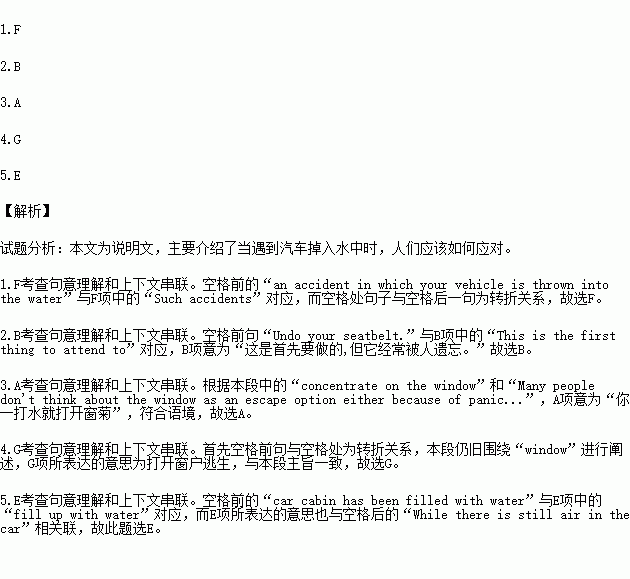题目内容
根据短文内容,从短文后的选项中选出能填入空白处的最佳选项。选项中有两项为多余选项根据短文内容.
Any car accident is frightening, but an accident in which your vehicle is thrown into the water, with you trapped inside, is absolutely(绝对地) terrifying.
1. . However, most deaths result from fear, without a plan or understanding what is happening to the car in the water. By adopting a brace(支撑) position, acting decisively and getting out fast, you can save yourself from a sinking vehicle.
Brace yourself for impact (撞击力). As soon as you're aware that you're going off th e road and into a body of water, adopt a brace position. The impact could set off the airbag system in your vehicle, so you should place both hands on the steering wheel(方向盘) in the "ten and two" position.
Undo your seatbelt. 2. . Release the children, starting with the oldest first. Forget the cell phone call. Your car isn't going to wait for you to make the call.
3. . Leave the door alone at this stage and concentrate on the window. A car's electrical system should work for up to three minutes in water, so try the method of opening it electronically first. Many people don't think about the window as an escape choice either because of fear or misinformation about doors and sinking.
Break the window. If you aren't able to open the window, or it only opens halfway, you'll need to break it with an object or your foot. It may feel counter-intuitive (有悖常理的) to let water into the car. 4. .
Escape when the car has equalized. If it has reached the stage where the car has been filled with water and it has become balanced, you must move quickly and effectively to ensure your survival. 5. . While there is still air in the car, take slow, deep breaths and focus on what you're doing.
A. Open the window as soon as you hit the water.
B. This is the first thing to do, yet it often gets forgotten.
C. Surviving a sinking car is not as difficult as you think.
D. In short, if you know what to do in the water, you will be safe.
E. It takes 60 to 120 seconds for a car to be filled with water usually.
F. Such accidents are particularly dangerous to the risk of drowning(淹死).
G. But the sooner the window is open, the sooner you can escape directly through it.


 st my younger brother and myself in the house. One evening Dad came home from and there was no food in the house, not a piece of bread. Although we were , my brother and I went to bed without eating anything.
st my younger brother and myself in the house. One evening Dad came home from and there was no food in the house, not a piece of bread. Although we were , my brother and I went to bed without eating anything.